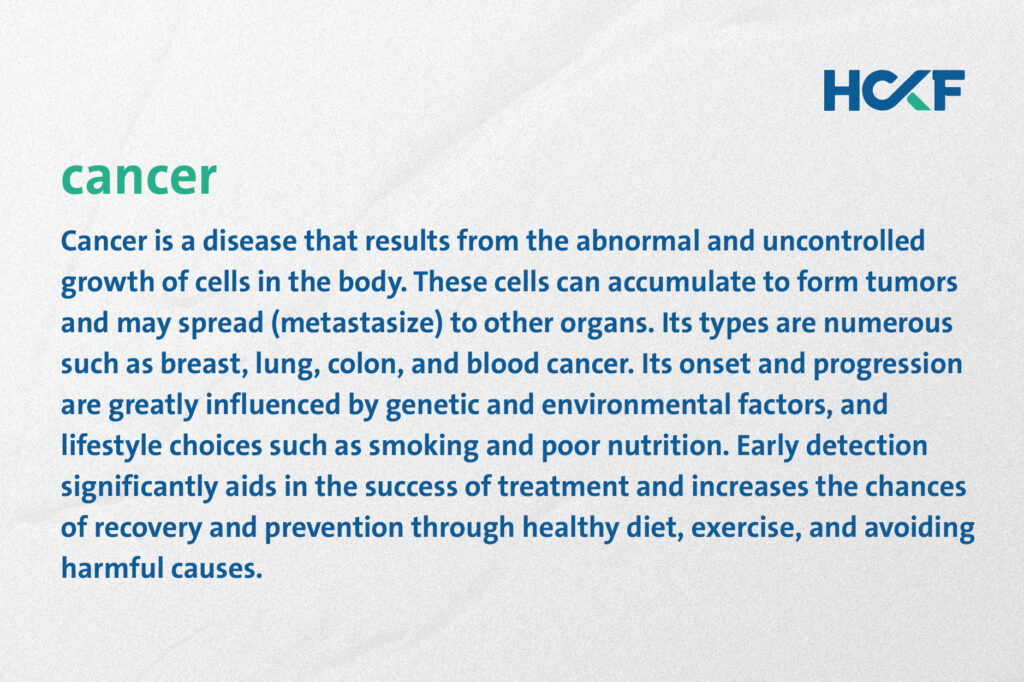
Introduction:
We at the Hadhramout Cancer Control Foundation are pleased to provide you with this information about cancer, with the aim of spreading awareness and education about this disease and its role in the lives of individuals and communities.
What is cancer?
Cancer is a complex disease resulting from the abnormal growth of cells in the body. When these cells grow uncontrolled, they can aggregate and form tumors, attack nearby tissues, and spread to other parts of the body through the bloodstream or lymphatic system.
What are the types of cancer?
There are more than (200) types of cancer, classified according to the type of cells from which they arise. Here are the most common types of cancer:
- Breast cancer
- Lung cancer
- Colon and rectal cancer
- Prostate cancer
- Skin cancer
- Stomach cancer
What are the symptoms of cancer?
The symptoms of cancer vary depending on its type, location, and stage of progression. While there may be no symptoms in the early stages, some symptoms may indicate the presence of a tumor and require immediate medical examination. Therefore, a specialist should be consulted if any persistent bodily changes occur for a period of time and have no clear explanation. General symptoms may include:
- Lumps or tumors.
- Constipation or irregular bowel habits.
- Persistent fatigue.
- Unexplained weight loss.
- Pain
- Changes in bodily functions
- Bleeding (blood in stool) or any abnormal discharge
Cancer Risk Factors:
There are several factors that can increase the risk of cancer, including:
- Age: The likelihood of developing cancer increases with age.
- Family history: Having family members with cancer increases the risk.
- Lifestyle: Smoking, drinking alcohol, an unhealthy diet, and lack of physical activity all increase the risk of cancer.
- Exposure to carcinogens: such as ultraviolet rays, chemicals, and radiation.
Cancer Prevention:
There are many steps you can take to prevent cancer, including:
- Quitting smoking
- Reducing alcohol consumption
- Eating a healthy diet
- Regular physical activity
- Sun protection
- Regular medical checkups
How is cancer treated?
Cancer treatment depends on its type, stage, and the patient’s overall health. Common treatment options include:
- Surgery: Removing tumors and cancer cells.
- Chemotherapy: Using medications to kill cancer cells.
- Radiotherapy: Using radiation to kill cancer cells.
- Immunotherapy: Stimulating the immune system to fight cancer.
- Targeted therapy: Targeting cancer cells specifically.
- Hormone therapy: The patient is given external hormones to alter the body’s endocrine system.
What are the steps to living with cancer?
- Accepting reality:
The first step is to accept reality, accept God’s will, and face the disease courageously. Ignoring or denying it will not help; it will only make matters more difficult. 2. Understand the Disease:
Learn reliable information about your type of cancer, its stages, and the available treatment options. Understanding the disease will help you make informed decisions about treatment and give you a greater sense of control. - Communicate with Your Doctor:
Maintain open and honest communication with your doctor. Ask them all your questions and concerns. Don’t hesitate to ask for clarification or change your treatment plan if necessary. - Follow Your Treatment Plan:
Strictly adhere to the treatment plan prescribed by your doctor, whether it involves surgery, chemotherapy, radiation, or any other type of treatment. Your commitment to treatment is key to successful cancer control. - Maintain a Healthy Lifestyle:
Make sure to eat a balanced diet rich in fruits and vegetables, exercise regularly, and get enough sleep. A healthy lifestyle will boost your immune system and help you cope with the side effects of treatment. - Join Support Groups:
Connecting with others going through the same experience is an important source of support and encouragement. - Seek Psychological Help:
Don’t hesitate to seek psychological help from a professional if necessary. - Enjoy Life:
Don’t let cancer control your life. Try to enjoy the simple things that make you happy. Make time for the people you love, pursue your hobbies, and give yourself a chance to laugh and relax.
Remember:
- Don’t give up: Cancer is powerful, but you are stronger.
- Have hope: There are many success stories of cancer patients who have overcome the disease and lived long, healthy lives.
- You are not alone: There are many people who care about you and want to help you.
Conclusion:
We hope this information is helpful. Raising awareness about cancer is an important step in the fight against it.
For more information, please contact us.
